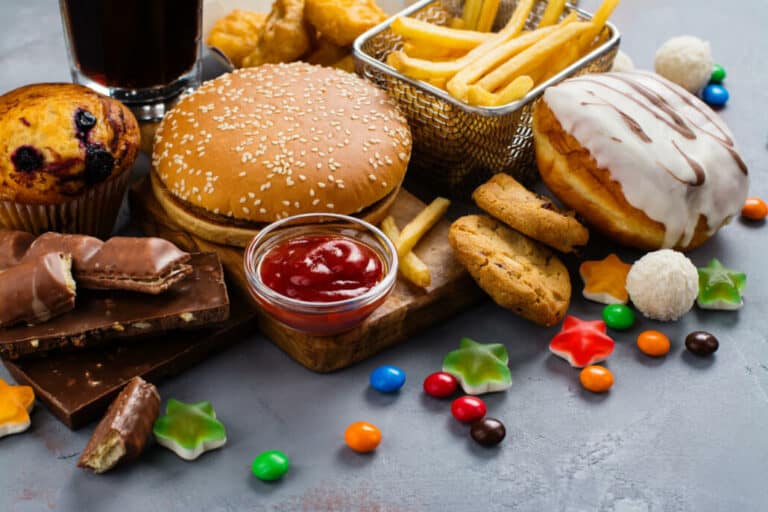Burger or pizza? Dr Michael Mosley’s celebrity junk food diet experiment
Fourteen years ago I watched an extraordinary documentary called Super Size Me, directed by an American called Morgan Spurlock. For a month Spurlock ate only food you could buy in McDonald’s restaurants, consuming an average of about 5,000 calories a day. In the course of making the documentary Spurlock put on 1st 10lb. More worrying, his levels of liver fat and cholesterol soared, his libido flopped and he reported extreme mood swings.
I was fascinated by this, so when ITV asked me to oversee something similar, I readily agreed. For The Junk Food Experiment we asked six famous faces to confine themselves to eating Britain’s three favourite takeaway foods — pizza, fried chicken and burgers — for three weeks to see which (if any) had the biggest impact.
We had several medical experts on board, including Dr Fredrik Nystrom, a droll Swedish professor from Linkoping University. Nystrom has run overfeeding experiments with young medical students, but what attracted him to ours was that our volunteers were mainly middle-aged and half were women. “I have found it impossible to recruit older women for an experiment where they might become seriously fat,” he told me.
One of the first famous faces to say yes was the 45-year-old singer and songwriter Peter Andre. Peter works out six times a week and said that he was looking forward to having the excuse to pig out on junk food. When we tested him at the start of the experiment he was in good shape.
Shaun Wallace, a 58-year-old barrister known to ITV viewers as the Dark Destroyer on the quiz show The Chase, also does a huge amount of exercise. He was convinced that he could burn off the extra calories.
Tory MP Nadine Dorries, 61, was our third volunteer. She was a real trouper and I particularly enjoyed the sight of her heading into Downing Street clutching her burgers. On another occasion she was spotted sharing chips with her fellow Brexiteer Jacob Rees-Mogg.
Our fourth volunteer was Tessa Sanderson, 62, the six-time Olympian and gold medal-winner in the javelin. She believed that her fitness would protect her against the worst effects of the experiment.
The person I was most anxious about was Hayley Tammadon. The 42-year-old Coronation Street actress had suffered from irritable bowel syndrome for many years and I feared that junk food would make it flare up. She, however, was up for the challenge.
Finally, adding a bit of posh to our set of human guinea pigs, was the Made in Chelsea star Hugo Taylor, 32. Like the others he was curious to see what impact junk food would have on his body. He was also the most anxious. “I am more nervous about this than anything I have done before,” he told me. “It’s taking me way outside my comfort zone.”
The experiment we set up is known as a “crossover study”. I put our volunteers into pairs and allocated a different fast food to each pair. Peter and Nadine began with pizza, Shaun and Hayley got stuck into fried chicken, and Tessa and Hugo were asked to restrict themselves to burgers. The plan was that they would spend a week eating each type of food. Because they would be eating their foods in different orders and we would be monitoring them throughout, we would be able to get a measure of which diet was having the biggest impact.
So what were we expecting to see? Well, Nystrom certainly expected them to put on weight, but he wasn’t sure what else would happen. Unlike Spurlock, his young volunteers had adapted surprisingly well to his previous overfeeding experiments. What none of us predicted was just how bad things would get.

Weight gain
Not surprisingly most of our volunteers put on weight (some didn’t) and this wasn’t just because we were asking them to consume more calories than normal. There is something about junk food that seems to override our normal feedback mechanisms and encourages us to overeat.
This was shown in a recent study where American researchers recruited healthy adults and split them into two groups. One group were asked to live for two weeks on junk food, followed by two weeks of healthy, home-cooked meals made with fresh ingredients. The other group did the same thing, but the other way round. The volunteers were confined to the lab to make sure they didn’t cheat, and provided with all their meals.
The healthy and the junk-food meals contained roughly the same amounts of fat, sugar, salt and carbs. The volunteers were asked to eat only to the point where they felt comfortably full, no more.
The scientists discovered, to their surprise, that when their volunteers were on the junk food diet they ate, on average, 500 calories more a day than when they were eating the healthy meals. They weren’t aware that they were doing this, nor did they think the junk food was in any way “nicer”. In two weeks they put on an average of 1.7lb on junk food, but lost 2.4lb on the healthy regimen.
Is junk food addictive?
One of the things that all our volunteers were worried about was becoming “addicted” to their new diet. Although some experienced the equivalent of “cold turkey” when they stopped, most didn’t.
Dr Tony Goldstone, who is based at Imperial College London, uses magnetic resonance imaging to study the impact of different foods on our brains. He says that junk food activates the same brain circuits as addictive substances such as drugs and alcohol, which might explain why so many people are overeating to the point of obesity.
Junk food is clearly not as addictive as cocaine or alcohol, but it shares some of those qualities. The pleasure you get from it is normally short-lived. It is about compulsion rather than pleasure. We eat junk food knowing it is bad for us. And once we start we find it hard to stop.
I love chocolate, particularly milk chocolate. My cravings for chocolate have nothing to do with hunger. I have broken up a chocolate bar and thrown it in a bin, then, minutes later, started to root around in that bin. A particularly low point was when I ate my six-year-old daughter’s Easter egg.
Food manufacturers, of course, are well aware of our vulnerabilities and have worked hard to make their products as “addictive” as possible. Knowing this may help you to fight back. Ever since I told my kids some of the things that Big Food has done to get us hooked, they have been less enthusiastic about going to burger bars.
Impact of junk food on the gut
Another striking finding from our experiment was the devastating effect that a junk food diet had on our volunteers’ guts. As feared, Hayley began to suffer badly when her irritable bowel syndrome returned with a vengeance. IBS is very common and is often the result of a “beige diet”, one overly dependent on highly processed foods.
Hayley was not the only one whose guts were affected. Almost everyone became constipated. Although she didn’t put on a huge amount of weight, Nadine soon began to swell alarmingly, to the point where she struggled to do up her jeans. Tests showed that after three weeks her guts were so inflamed they looked as if she had a serious bowel disease.
Other changes
The other changes we saw in our volunteers were more individual. Hugo got progressively more anxious and distressed while on the junk food diet. This may have been purely psychological — he is normally a super-healthy eater — but there could have been another factor. We know that junk food causes inflammation in the gut, which in turn can lead to anxiety and depression. There is a new science of “psychobiotics” exploring this link.
Tessa suffered from soaring blood pressure and Shaun experienced sleep apnoea — when you temporarily stop breathing during sleep. In fact a short while into the experiment all of them were sleeping badly and reporting low moods. Peter was particularly alarmed to discover that his liver enzymes had begun to shoot up — a possible indication of inflammation or cell damage. Something similar had happened to Spurlock when he went on his junk food diet.
Fortunately, all these changes began to improve once they reverted to a healthy regimen.
You could argue that we all know that eating junk food is bad for us, so what does an experiment like this really show? Well, there are plenty of people in the UK who eat junk food once or twice a day and despite numerous health warnings the consumption of fast food and ready-made meals continues to rise at an alarming rate. If this programme alerts more people to the often hidden dangers of “convenience” foods, it will be job done.











